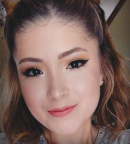A minor car accident I had with my mother when I was 17 probably saved my life. We were taken to the hospital for a routine checkup, and a subsequent chest x-ray found multiple nodules on my lungs. I underwent dozens of other imaging and blood tests, and finally, my pediatrician suggested my parents take me to a pulmonologist for an examination. The pulmonologist recommended a biopsy of the lung nodules, and the pathology results were completely unexpected—and devastating. The biopsy confirmed that I had stage II papillary thyroid carcinoma, sclerosing variant, which had metastasized to my lungs and nearby lymph nodes.

“I’ve been given a second chance at life, and I’m excited to see what that life brings.”— Morgan Romero
Tweet this quote
Like many teenagers, I had been active in sports and maintained a full academic curriculum during my junior year in high school; until the accident, I hadn’t experienced any symptoms that might indicate a serious life-threatening disease like cancer. The oncologist I saw immediately started me on the oral multikinase inhibitor sorafenib, which failed to stop disease progression, and the damage to my lungs from the cancer was so severe, it was difficult to breathe. I was constantly hospitalized for respiratory problems, and, despite additional treatment for the cancer, the disease continued to spread.
Just weeks after being diagnosed, my oncologist told my parents there was nothing more he could do and suggested they consider hospice care. As young as I was, I understood that meant I was dying, and I wondered how I could be so close to death when, until recently, I seemed to be so healthy.
Surviving Cancer
Unable to accept the prognosis, my parents took me to a major cancer center for a second opinion. There, the oncologist performed genomic sequencing on the tumor and found that it was RET fusion–positive. I was offered a clinical trial investigating pralsetinib, a selective RET inhibitor, which had shown promising results in earlier studies of patients with my type of thyroid cancer. [Editor’s Note: In December 2020, the U.S. Food and Drug Administration approved pralsetinib for adult and pediatric patients with advanced or metastatic RET-mutant medullary thyroid cancer who require systemic therapy or RET fusion–positive thyroid cancer who require systemic therapy and who are radioactive iodine–refractory, if radioactive iodine is appropriate.]
But before I could enroll in the study, I developed pneumonia in both lungs and had to be hospitalized for 6 weeks. My breathing became so labored, I was placed on a ventilator three times. My weight dropped to a dangerously low 70 lb, and I was terrified that I was going to die.
Eventually, the doctors were able to get the pneumonia under control, and I was allowed into the clinical trial. After just one dose of pralsetinib, I started to feel better; for the first time since my diagnosis, I had hope that I could survive this cancer.
Nine years later, I am still on the clinical trial. Although several small malignant lesions remain on my lungs, the cancer is stable, and I no longer need oxygen to help me breathe. My once-terminal cancer is now being treated as a chronic disease, and I can see a future ahead of me.
Learning to Live With Cancer
I was scared when I was diagnosed with cancer, as anyone would be, but I was so young, I didn’t know what was going to happen, how my life would change, or even if I was going to live. I had to finish my high school education at home, isolated from my classmates and my friends, and that was difficult. I had plans to go to college, which had to be postponed for several years while I underwent treatment. I was finally able to graduate from college in 2020 with a bachelor of arts degree in psychology, and I may pursue a master’s degree.
Although I’m not cancer-free, I’m hoping I will be someday, or at least that the cancer will remain chronic and manageable. In the meantime, I am anxious to get on with my life and live more fully. So many years were taken from me at crucial junctures in my social and educational development, and I don’t want to lose any more time. Like everyone now, my social activities are somewhat restricted because of the ongoing COVID-19 pandemic, but once we are free from the danger posed by this deadly virus, I want to experience all the joys—and challenges—of young adulthood.
I’m looking forward to starting my career, reengaging with friends, and dating. I’ve been given a second chance at life, and I’m excited to see what that life brings.
Ms. Romero lives in Fort Worth, Texas.
Editor’s Note: Columns in the Patient’s Corner are based solely on information The ASCO Post receives from patients and should be considered anecdotal.

